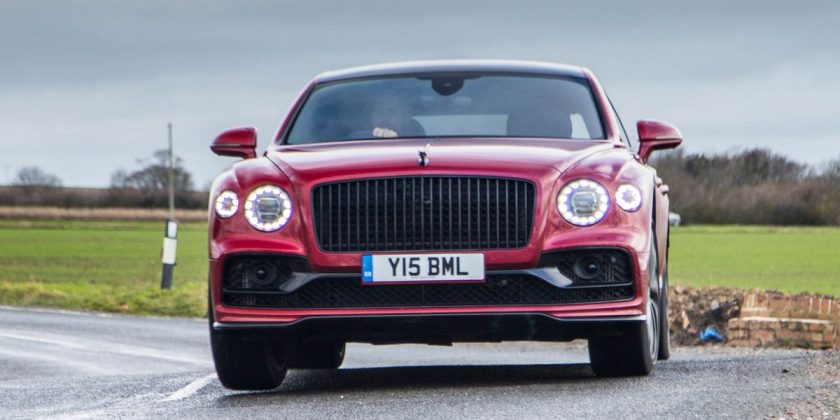The W12 is perhaps Bentley‘s greatest USP. No other VW Group brand still uses the mammoth engine, and enough of the things are churned out at Crewe every year to make the British subsidiary the world’s biggest producer of 12-cylinder engines.
The writing is on the wall for the W12, with Bentley pledging to go fully electric by 2030, but for now, speccing one of its products with this 6.0-litre twin-turbo engine feels like the proper thing to do. And yet, ditching it for a smaller, more ordinary V8 normally results in a better car.

That’s definitely the case with the Continental GT, but how about the Flying Spur and its new V8 option? Although it shares a lot of the same bits as the Conti, the two are more separate than ever. And in this bigger, even plusher saloon setting, the W12 might just be the better bet.
On paper, the performance difference isn’t that huge. The 4.0-litre engine, found in the Porsche Panamera, the Audi RSQ8 and much more besides develops 542bhp and 568lb ft. This is sent to all four wheels via a reasonably slick eight-speed ZF automatic gearbox, in place of the W12’s dual-clutch unit. Those numbers sound a long way off the 626bhp, 664lb ft W12, but the V8’s weight advantage (we’ll come back to that) means there’s only a couple of tenths difference in the 0-62mph figure.

The V8 does the deed in four seconds dead, on to a top speed of 198mph. The W12 will keep going until 207mph, but 198 isn’t what you’d call sluggish.
Sure enough, press the accelerator all the way down to the Flying Spur V8’s thick carpets, and you’ll be pinned to the back of the quilted leather driver’s seat as the speeds rise dramatically. It’s impressively responsive for a turbo engine too, with precious little lag to spoil the fun. It also sounds good, and quite unlike the many other VW Groups cars to use this engine thanks to Bentley’s bespoke exhaust.
What you are missing, though, is that sense of shock and awe the W12 provides. And perhaps more relevantly, the effortlessness when you want to build speed with a little less throttle. It only takes a little tickle of the right-hand pedal to get the speed where you want. The V8 doesn’t have to be worked that much harder to achieve the same, but it’s a noticeable difference.

What also makes a noticeable difference is the weight loss over the front end, which is an incredible 100kg. That’s like removing in-his-prime Arnold Schwarzenegger from the engine bay, although it does take some time to work up to a point where the effects can be felt.
The Flying Spur is a big old thing, with its dimensions seeming all the more ridiculous on a narrow B-road. Plus, even with the lighter engine, it weighs 2330kg. Attune to the size and bulk, though, and you soon realise the Flying Spur can do marvelous things when your faith is placed in it.

The W12 is already mighty impressive when lofty demands are aimed at its chassis, but with less up front to weigh it down, it changes direction even more effectively. Standard-fit three-chamber air suspension and optional active-anti-roll bars help keep the body remarkably stable, and in tighter stuff, rear-wheel steering (also optional, and worth it) gives the feeling of a much smaller wheelbase.
The all-wheel drive system biases the rear wheels, although this isn’t always obvious, given the oodles of traction offered up. Greedy throttle applications with the ESP set to ‘sport’ will make the car rotate – not by much, but enough to feel mischievous in a £150,000 luxury land yacht such as this.

As bizarrely brilliant as it is tearing the local B-road a new one, it’s the wafty stuff where the Spur V8 really shines. Other than thevulgarity of requiring one (or one’s hired driver) to press the throttle a little harder to build speed, it’s as good at this as the W12 version.
The ride is supremely smooth in Comfort mode, to the point where expectations of how the road surface might feel need to be rethought. That pothole around the corner from your house, which you normally wince in anticipation for? It doesn’t even exist in Flying Spur land.

Away from full bore acceleration in Sport mode, the V8 produces little more than a whisper in the cabin, and there’s not much in the way of road noise either. There was some surprise wind noise coming from the seals on the driver’s door, although this was easy enough to tune out after a while.
Inside, there’s a whole lot of very recognisable Audi switchgear, but if you’re going to borrow some stuff, that’s not a bad parts bin to raid. It all sits well alongside the usual lovely Bentley details like the metal ‘organ-stop’ vent controls.

Along with having a slightly less insatiable appetite for unleaded (it manages 22mpg on the combined cycle, up from 19), the V8 Flying Spur is also more friendly on the wallet when it comes to buying one in the first place. At £153,900 the starting price is over £20,000 less than the W12.
The 12-cylinder Spur is already a subjective bargain, considering everything it can do, so a lightly slower version for a little over £150k (plus expensive options, obvs) seems like a steal. Or as close as a luxury car can come to being described thusly. Yes, a Rolls-Royce Ghost feels posher and is better at the wafty stuff, but it isn’t as fun to drive, costs £100,000 more and is a tad too showy.
But does the Flying Spur V8 win against the W12? Not quite. In this setting, there is something to be said about the excess of the 6.0-litre option – it fits the car better. Just don’t go thinking that makes the V8 a poor relation, as it’s very nearly as good. And that’s high praise.
Source: Read Full Article
